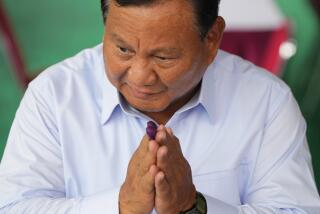Malaysian Leader Barely Survives Intraparty Fight
KUALA LUMPUR, Malaysia — Prime Minister Mahathir Mohammed on Friday narrowly defeated a challenge within his party, a test that may weaken his hold as Malaysia’s national leader.
Mahathir received 51.4% of the vote for the party presidency, turning back the challenge of Razaleigh Hamzah, his minister of trade and industry. No Malaysian prime minister has come so close to defeat in a party or national election since independence from Britain 30 years ago.
Mahathir told reporters after the results were announced: “I had said I would continue to serve with a majority of one. I got more than that (a 43-vote majority out of the nearly 1,500 cast).”
He called for party unity, as did the defeated Razaleigh, but the loser added: “We still represent about 50%. . . . We are still a force to be reckoned with.”
Mahathir, a 62-year-old former country doctor, gained some political breathing room when Musa Hitam, 53, considered his strongest potential rival, lost a bid to retain the party deputy presidency.
Pair Formed ‘2-M’ Team
Musa came to power with Mahathir as deputy prime minister in 1981, and the two formed the “2-M” team that led Malaysia in a period of strong economic growth. Personal and political differences broke up the team in February of 1986. Musa resigned his government post and, according to political analysts, began positioning himself to succeed his former colleague.
Ghafar Baba, 62, who replaced Musa last spring as deputy prime minister, defeated him Friday for the No. 2 party post. The results were announced late Friday at the triennial meeting of the United Malays National Organization (UMNO), which has been the undefeated political vehicle of the Malay majority in this country’s multiracial society since independence.
UMNO is the main partner in the ruling National Front coalition, and is dedicated to preserving political power and developing economic opportunities for the Malays, a thin majority of Malaysia’s 16 million people. Before the voting Friday, both Mahathir and Musa called on the party to reunite whatever the result, but the divisions are deep.
The close vote for the party presidency seems bound to damage Mahathir’s political base, and therefore his latitude as government leader. No major changes in domestic or foreign policy are expected. None of the candidates was immediately available for comment.
Led Front to Victory
Nine months ago, Mahathir stood at his political summit. Deserted by Musa and facing a strong challenge from the fundamentalist Parti Islam, the prime minister led UMNO and the umbrella National Front to a landslide election victory in early August.
The front, which includes Chinese and Indian parties as well as the Malay UMNO, won 148 of the seats in Parliament. UMNO alone picked up 83 of the 84 seats it contested, and an overwhelming majority of state assembly seats.
Rejecting calls of the defeated opposition for economic and social changes, the triumphant Mahathir said: “We think we’re on the right track. That’s why we have been reelected. . . . We will follow what our supporters want us to do.”
But the momentum was short-lived. Sniping continued by party dissidents and the opposition, primarily the Chinese-dominated Democratic Action Party. The two-year recession showed few signs of easing, and financial scandals swirled without letup around some political allies of Mahathir, though the prime minister himself was not implicated.
With the approach of this week’s UMNO conference, a normally placid affair, the leadership fight broke into the open. Meeting in Davos, Switzerland, six weeks ago, Musa and Razaleigh agreed to pool forces, with Razaleigh challenging Mahathir for the party presidency and Musa taking on Ghafar for the deputy presidency.
Attacked ‘Opportunists’
Political analysts figured Razaleigh could deliver about 500 of the 1,479 conference votes and Musa about 200. With Mahathir’s committed strength calculated at 500 to 600, about 200 uncommitted delegates appeared to hold the balance.
Mahathir attacked the Razaleigh-Musa team as an alliance of opportunists. The charge had credence, since the two men were longtime political foes; Musa had twice defeated Razaleigh in party elections for the deputy presidency.
In a 45-minute speech to the UMNO delegates before the vote, the prime minister defended his six-year record in office and said party unity was threatened by “political ambition.”
Razaleigh campaigned primarily on economic issues but, according to diplomatic observers here, offered few new ideas. Musa, whose relaxed style contrasts sharply with Mahathir’s stiff, almost arrogant, demeanor, said the party and the country need new leadership, suggesting it is time for Mahathir to withdraw. But that is not a likely prospect.
“He’ll have to be carried out with his boots on,” one diplomat said. “Some Asian leaders would resign in the face of this sort of criticism. Mahathir is obviously a different sort of man.”
In recent months, political analysts here say, Mahathir had narrowed the circle of power to trusted allies. Perhaps as a result, nearly half of the UMNO members of the Cabinet joined the Razaleigh-Musa forces.
More to Read
Sign up for Essential California
The most important California stories and recommendations in your inbox every morning.
You may occasionally receive promotional content from the Los Angeles Times.










